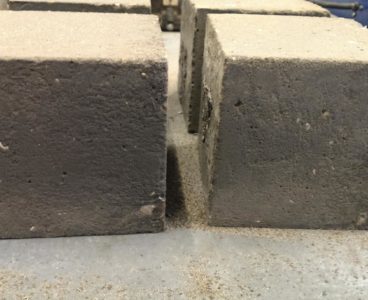The wonder-material graphene could hold the key to unlocking the next generation of advanced, early stage lung cancer diagnosis. A team of scientists from the University of Exeter has developed a new technique that could create a highly sensitive graphene biosensor with the capability to detect molecules of the most common lung cancer biomarkers. The…
Innovative Technique Could Pave Way for New Generation of Flexible Electronic Components
Research Sheds New Light on What Drove Last, Long-Term Global Climate Shift
Microplastics Found in All Sea Turtle Species
Graphene Offers Fresh Potential for ‘Smart Textiles’
The quest to create affordable, durable and mass-produced “smart textiles” has been given fresh impetus through the use of the “wonder material” graphene. An international team of scientists, led by Professor Monica Craciun from the University of Exeter Engineering department, has pioneered a new technique to create fully electronic fibers that can be incorporated into…
You Say You Want a Computing Revolution
Scientists have discovered new particles that could lie at the heart of a future technological revolution based on photonic circuitry, leading to superfast, light-based computing. Current computing technology is based on electronics, where electrons are used to encode and transport information. Due to some fundamental limitations, such as energy-loss through resistive heating, it is expected…
New Half-light Half-matter Particles May Hold the Key to a Computing Revolution
Scientists have discovered new particles that could lie at the heart of a future technological revolution based on photonic circuitry, leading to superfast, light-based computing. Current computing technology is based on electronics, where electrons are used to encode and transport information. Due to some fundamental limitations, such as energy-loss through resistive heating, it is expected…
Camouflaged Plants Use the Same Tricks as Animals
Plants use many of the same methods as animals to camouflage themselves, a new study shows. Research on plant camouflage is limited compared to the wealth of knowledge about how animals conceal themselves. But a review by scientists from the University of Exeter and the Kunming Institute of Botany (Chinese Academy of Sciences) found plants…
A New Ray of Hope for Solar Power
The quest to develop the “Holy Grail” of affordable, viable and environmentally friendly fuels using sunlight has taken an exciting new twist. A team of Renewable Energy experts from the University of Exeter has pioneered a new technique to produce hydrogen from sunlight to create a clean, cheap and widely available fuel. The team developed…
Research Gives New Ray of Hope for Solar Fuel
Scientists Create Innovative New ‘Green’ Concrete using Graphene
Scientists Create Innovative New ‘Green’ Concrete Using Graphene
A new greener, stronger and more durable concrete that is made using the wonder-material graphene could revolutionise the construction industry. Experts from the University of Exeter have developed a pioneering new technique that uses nanoengineering technology to incorporate graphene into traditional concrete production. The new composite material, which is more than twice as strong and…
Scientists Create Magnetic System That Transforms Heat into Motion
Nanoscale ‘Abacus’ Uses Pulses of Light to Perform Calculations
Scientists Create Magnetic System That Transforms Heat into Motion
Breakthrough in Understanding Mitochondria
Scientists have made a breakthrough in understanding how mitochondria – the “powerhouses” of human cells – are made. Mitochondria, which exist within human cells but have their own DNA, need many different proteins to function – but the process of how they get these has never been imaged in detail. Now a study led by…
Pioneering Research Tames Nanoquakes
New Research Encourages Graphene to “Talk”
A pioneering new technique that encourages the wonder material graphene to “talk” could revolutionize the global audio and telecommunications industries. Researchers from the University of Exeter have devised a ground-breaking method to use graphene to generate complex and controllable sound signals. In essence, it combines speaker, amplifier and graphic equalizer into a chip the size…
Computer Game Helps Scientists Understand Animal Camouflage
Online computer games played by more than 30,000 people have helped scientists understand animal camouflage and colour vision. Researchers from the University of Exeter wanted to know why many animals are dichromats (having two types of colour receptor cells in their eyes) while others, like humans, are trichromats (with three types of colour cells), and…
Granites Could Help Pinpoint Metals Crucial for Low-Carbon Tech
The composition of vast swathes of granite found underneath much of the South West peninsula of Britain could offer a vital clue to where deposits of metals crucial for the production of many low carbon technologies can be found. A team of researchers, led by experts from the world-renowned Camborne School of Mines, part of…
Super-Fast, Flexible Memory Devices Revolutionize Electronics
An innovative new technique to produce the quickest, smallest, highest-capacity memories for flexible and transparent applications could pave the way for a future golden age of electronics. Engineering experts from the University of Exeter have developed innovative new memory using a hybrid of graphene oxide and titanium oxide. Their devices are low cost and eco-friendly…
A Revolution in Computer Electronics Manufacturing
A pioneering new technique to produce cutting-edge, versatile microchips could revolutionize the speed, efficiency, and capability of the next generation of computers. Researchers from the University of Exeter have developed an innovative new method to engineer computer chips more easily and cheaper than conventional methods. The discovery could revolutionize the production of optoelectronic materials —…
LED Lighting Could Have Major Impact on Wildlife
Antibiotics Can Boost Bacterial Reproduction
The growth of bacteria can be stimulated by antibiotics, scientists at the University of Exeter have discovered. The EPSRC-funded researchers exposed E.coli bacteria to eight rounds of antibiotic treatment over four days and found the bug – which can cause severe stomach pain, diarrhoea and kidney failure in humans – had increased antibiotic resistance with each treatment.…














